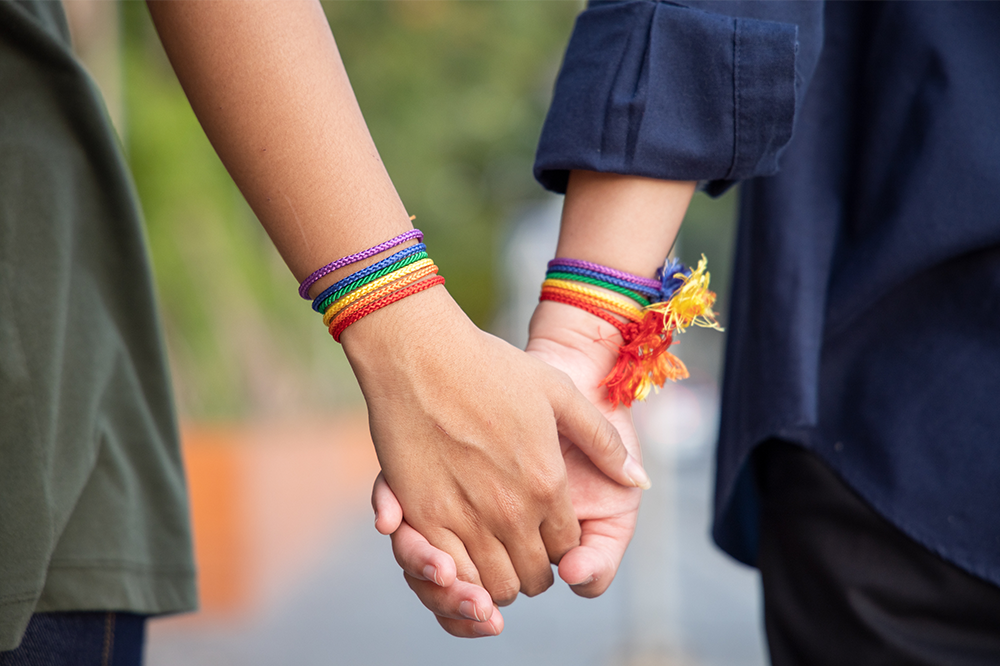Let’s face it, relationships can be tricky business – especially when it comes to sex!
However, in a heteronormative world, it can seem that advice and support is often only aimed at heterosexual or ‘straight’ relationships.
Whilst there are many factors which affect any sexual partnership, there are others which can be more or less important to LGBTQ+ relationships.
So, let’s take a look:
Staying safe online
Relationships increasingly begin online. There are many dating apps, websites, social media and online communities aimed at bringing like-minded lovers together. Sadly, this creates a wall behind which some people with bad intentions can hide.
The LGBTQ+ community may be no more or less affected than any other. However, with people keen to share, explore or understand their own gender identify and sexuality, it’s good to understand the risk that some people may be looking to take advantage of others.
Best advice is to always stay open minded. Like international diplomacy, it’s wise to ‘trust but verify’! Take time to get to know someone before taking the relationship further. If someone is worth getting to know, they will typically wait.
If you feel you might be vulnerable to someone trying to manipulate you, set personal boundaries on how much information you share. It’s best practise not to agree to meet someone unless it is in a public space, or you are accompanied by a friend.
Hygiene and STIs
Let’s face it, sex is a sticky business… in every sense!
As well as the relationship drama’s and the ‘do they/don’t they’, sex is an entirely natural process involving a number of bodily fluids.
Sadly, STIs are common in every group of society and the LGBTQ+ community is no different. In addition, the recent arrival of Monkey Pox amongst men who have sex with men has also highlighted the need for good hygiene.
For any person involved in sexual activity with a penis, a condom is always a wise choice. Whether its anal, oral or vaginal sex – or simply mutual masturbation and foreplay – a condom is the very best way to avoid passing on or contracting an itchy infection or worse.
Lubrication generally makes things go much more smoothly and makes the unlikely event of a split condom even more unlikely.
For people involved in sexual activity with a vagina, a so-called female condom or Femidom is equally effective. For oral sex, a Dental Dam (a thin sheet of latex laid over the vagina or anus) is a great way to avoid direct contact but still give pleasure.
Particularly with anal sex and play, there can also be the risk of spreading stomach bugs and similar infections. Avoiding oral contact and using anti-bacterial wash for intimate areas, hands and sex toys is good practise.
Breaking out of a heteronormative world
Though sex education is more inclusive than ever, it can still gravitate towards heteronormative (straight or different-sex) relationships.
It still remains great advice but there is always more we can all learn, including in LGBTQ+ relationships.
Sexual partners are better able to pleasure us when we can tell them what we like! So, it’s a good idea to get to know your own body, intimately. Particularly if you or your partner are trying things for the first time (such as with someone of an unfamiliar gender or sexual identity), it’s important to understand what you might enjoy.
You can get to know your own body through body mapping and masturbation – becoming familiar with your body by exploring every inch. This can include feel, look, taste and smell.
Your partner can become involved or be directed to the areas or ways in which you feel greatest pleasure. Neurodiverse or physically disable people can also find this highly rewarding.
Visual stimulation is a big part of sex for many, so you and your partner could explore erotic dancing, watching each other masturbate or viewing pornography together.
Don’t be afraid to explore new things and discuss them openly with your partner.
Healthy LGBTQ+ relationships
Whenever two (or more) people enter into a relationship, it can be messy! Woman, man, gay, straight, non-binary, intersex – regardless of the make-up, all relationships face challenges.
At the centre of any healthy sexual relationship is consent. Consent occurs when two or more people involved in any form of sexual activity agree to take part by choice.
Consent has limits. If the sexual activity you’re enjoying together changes or goes further than anticipated, it’s best to check your partner still consents. If you’re asked, don’t be afraid to say no or put limits on what’s OK.
From 16, people of any gender or sexuality can legally take part in sexual activity with any other partner over 16. Younger people of similar age can also explore sex but not (legally) with anyone over 18. No one under 13 can ever consent to sexual activity.
Sex without consent is illegal and constitutes sexual violence.
It’s perfectly fine for sex to just be for fun! However, relationships often develop to become more emotional. It’s OK to take a little time to consider the right way forward, especially if you’re still exploring your sexual or gender identity.
New relationships can be quite intense and partners can become a little intense or even obsessive. If you’re feeling pressure, its best to discuss it with your partner. Raise the subject sensitively, explain how you feel and ask your partner to share their feelings too.
If your partner’s behaviour makes you feel devalued, vulnerable or depressed, something is wrong. Distance yourself from your partner and seek support. If you ever feel physically or sexually threatened, report it to the police.
Ending a relationship is rarely easy – LGBTQ+ or otherwise. You may still be exploring your own gender or sexuality or simply ready for another partner. Relationships are a choice and if it isn’t working, you have every right to end it.
It is typically best to be calm, clear and act accordingly. If you wish to end the relationship, it’s often best to restrict your contact with the person. If you would like to remain friends, give your former partner space to come to terms with the new relationship.


